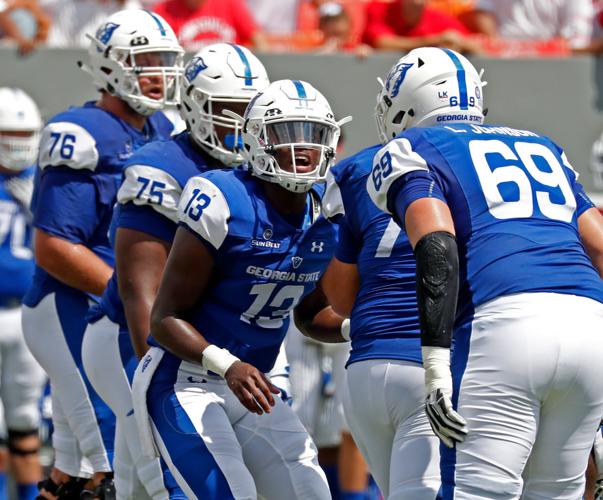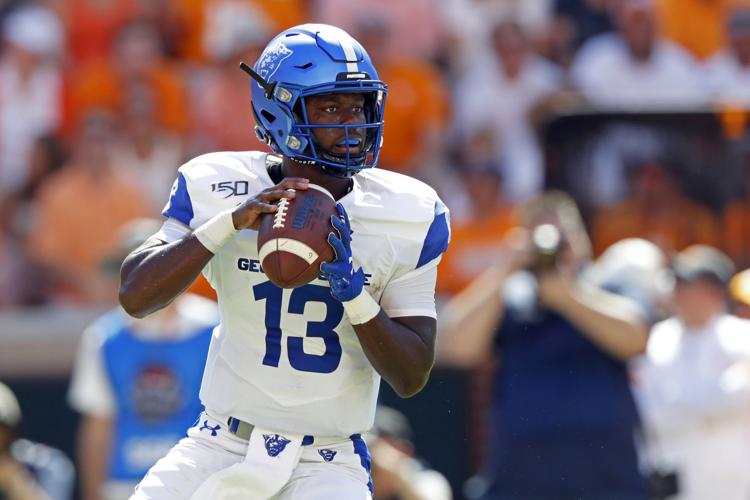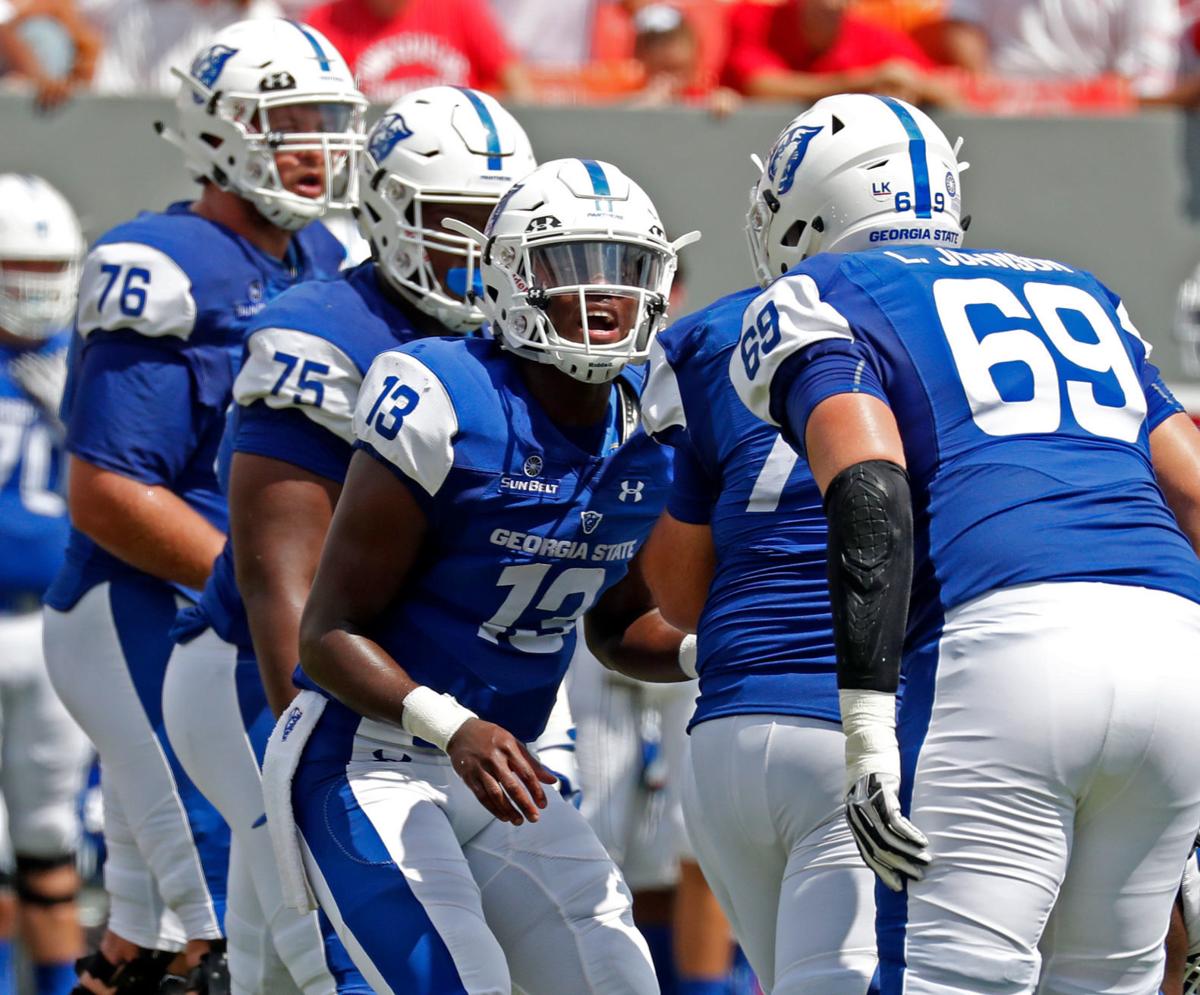If the three scariest letters in football are C-T-E, the second scariest are A, C and L.
When you put those three letters next to each other — ACL, as in torn — it almost certainly spells doom.
So when Dan Ellington walked (limped?) into Shawn Elliott’s office on a Monday night in November less than 48 hours after tearing his ACL against Louisiana-Monroe and told Elliott he wanted to play through the injury, the Georgia State head coach scoffed.
“I said, ‘Yeah, you know, well, that’s great and everything, but I don’t know I that’s gonna happen,’” Elliott recalls telling his prized pupil and trusted leader. “I wanted to let him down very easily. He says, ‘No, I’m serious.’”
Ellington, the signal-caller for a Panthers squad that has reached its third bowl game in five years, had torn his ligament on a non-contact play before halftime of an eventual 45-31 loss to the Warhawks. Midway through a defining season for the program — and hoping to make an impression on professional scouts in and out of the NFL — Ellington was crushed.
“I cried,” he said, “I went in the tent and I cried,” said Ellington, who will lead the Panthers into the Arizona Bowl against Wyoming on Tuesday.
He wasn’t crying from the pain. There surprisingly wasn’t much. More a dull ache than a sharp throb.
He was crying from the realization that all the work he’d put in could be for naught, done in by one false step. He was leading the Sun Belt Conference in total offense at the time.
When he walked out of the locker room after halftime on crutches, he found a spot on the sidelines and he barked encouragement at his team, because, he said, “I didn’t want my team to see me down.” As kickoff approached, he slinked off to the side, away from the action. He dropped the crutches.
He wasn’t going to let it end there. So he took a step. And then another. These were not false. He was surprised how easily he could move.
“I felt the pain, and I could tolerate that pain,” he said. “When the trainer got back from the locker room, I walked up to him. ‘Has anyone ever tried this? Is it possible for me to play?’ He started laughing.”
But by the time Ellington walked off the team plane that night, he knew it in his heart. He was going to play.
First came the convincing.
An MRI had revealed a full ACL tear, but the other ligaments were intact. By Monday, the swelling had gone down a bit, and the pain, while still a dull ache, was tolerable.
He asked Elliott, and Elliott was doubtful, if curious. Ellington asked his offensive coordinator, Brad Glenn, and Glenn said if it was OK with Elliott and the medical staff, it was fine by him. Ellington called his parents and got the go-ahead from them, and he showed up to Monday’s practice in a shell, his teammates stunned.
“He comes out to practice, stands on the sideline in sweats, and I’m doubtful,” Elliott said. “I look over, and he starts doing some dropbacks, just on his own, and I’m thinking, ‘What in the world are you doing?’ He says, I’m gonna play. Being who I am, I said, ‘Well, get in there. I want you to see you drop.’ He got in there and I think he went five reps for us, I turned to our OC and I said man, ‘You gotta be kidding me.’”
On Tuesday, Ellington reiterated to Elliott that he wanted to play, and his coach put it back in his hands. He wasn’t about to make that call himself, and he certainly was not about to risk Ellington’s future.
On Wednesday of that week, Ellington practiced in full gear and made it through the whole day. He’d passed Elliott’s eye test, but that still wasn’t enough.
Elliot had a phone call to make, to Ellington’s father, Dante. He wanted to reassure him that this was Ellington’s call and that he was healthy, and he sent over practice footage.
The footage was convincing on its own.
“When I saw his Wednesday practice film, I said there’s no doubt he can play,” Elliott said. “I’m not some hard-nosed coach (saying) ‘You’re gonna play through this.’ It was Dan coming and saying, ‘I’ve got four games left in my career. I’ve put a lot into this. It’s not going to be over like this.’”
For Elliott, who’d known Ellington for just a short time but already thought the world of him, this was no small thing.

Georgia State quarterback Dan Ellington (13) looks for a receiver in the first half of an NCAA college football game against Tennessee, Saturday, Aug. 31, 2019, in Knoxville, Tenn. (AP Photo/Wade Payne)
“Dan is very, very rare,” Elliott said. “This is a man I knew was different when he came in here and enrolled early for us. To tell you the truth, I stood right behind him. If it was me, I’d have done the same thing. This game is important to a lot of people and more important to some of us than others.”
It took a while to feel right, of course. It did not take long to look right.
That next game, against then-No. 25 Appalachian State, was a big one. The Mountaineers are the class of the Sun Belt, one of the best non-Power 5 conference programs in the country and frequent upset specialists.
“We came out very strong, and we had a great plan in place to keep him upright,” Elliott said. “Our protections were set. We were just going to use his strong mentality, leadership and his arm. We were up 21-7 and had a bad snap, and the snap went by him to the left, he turned and went to chase it. There was really no hesitation in it. Got up from that and it was like OK. He saw it happen and was just lie, you’ve got to get on this ball. It was a sudden reaction. He comes to the sideline and I’m thinking, I can’t believe what I’m seeing here. We’re gonna be OK. This guy is truly different.”

The Panthers’ defense eventually faltered that day in a 52-27 loss to the Mountaineers, but Georgia State rebounded a week later as Ellington felt like himself again.
He went 21 for 27 for 208 yards and two touchdowns in a 28-15 win over South Alabama, but more importantly, he proved something to himself.
He wouldn’t just play through the pain. He wouldn’t just survive. He could thrive.
“My knee had to get used to it, but now it’s not very swelled up, it doesn’t hurt, I’m not on any painkillers, I don’t get shots before the game,” he said. “It does ache when it gets irritated. That tells me I need to slow down a little bit. But pain? It doesn’t hurt. I get taped, sleeved, leggings, brace and I go out and play.”







